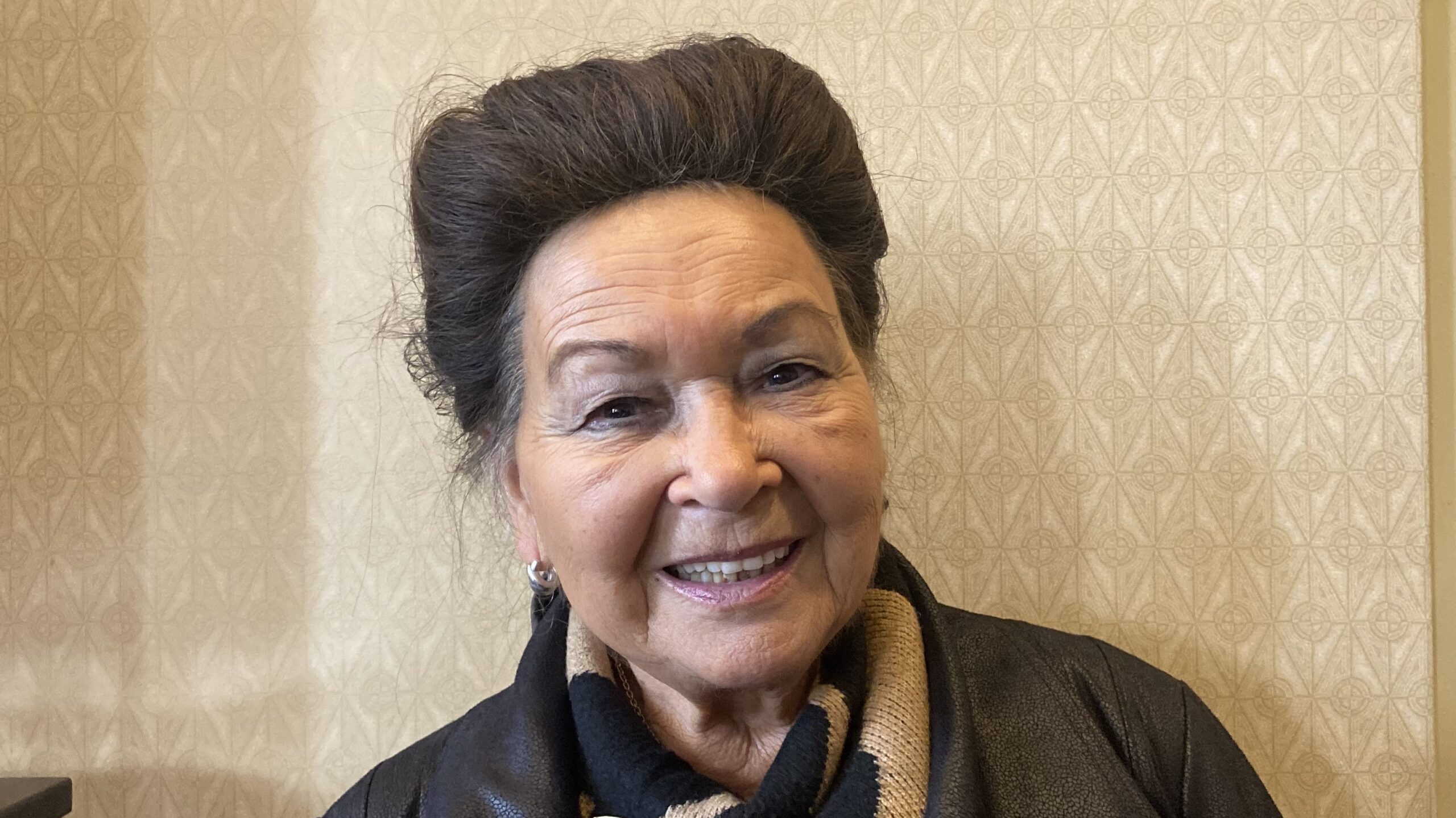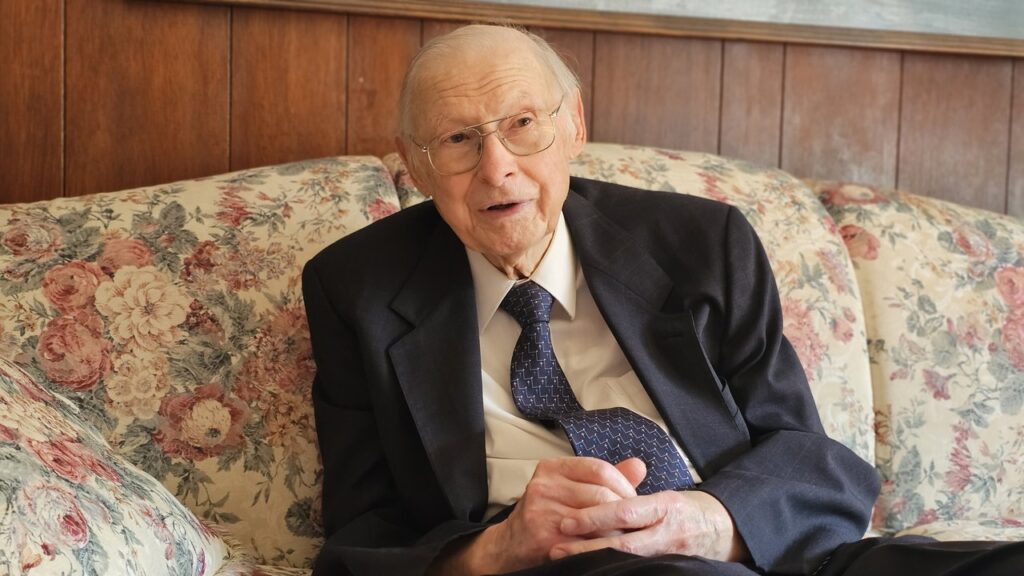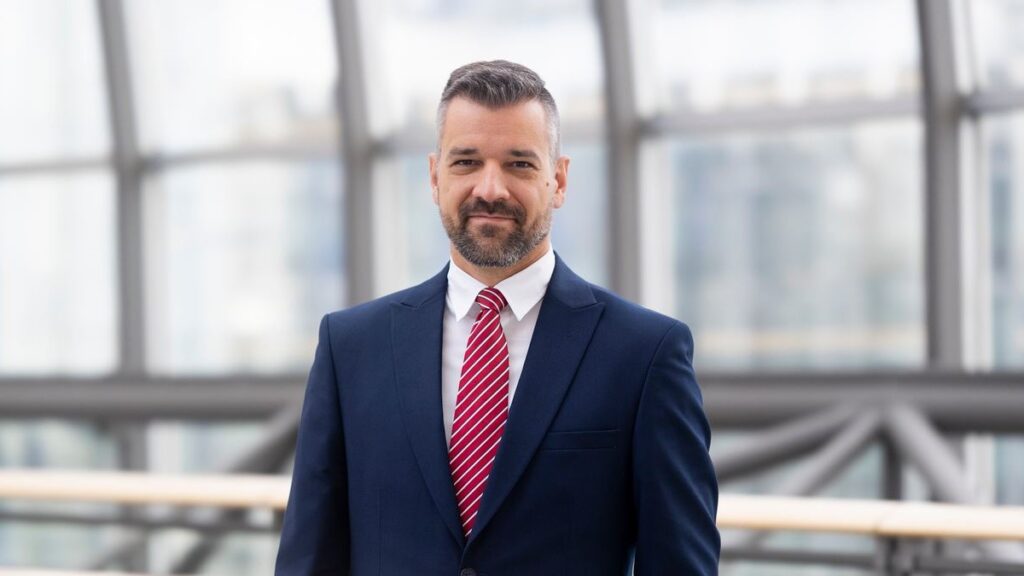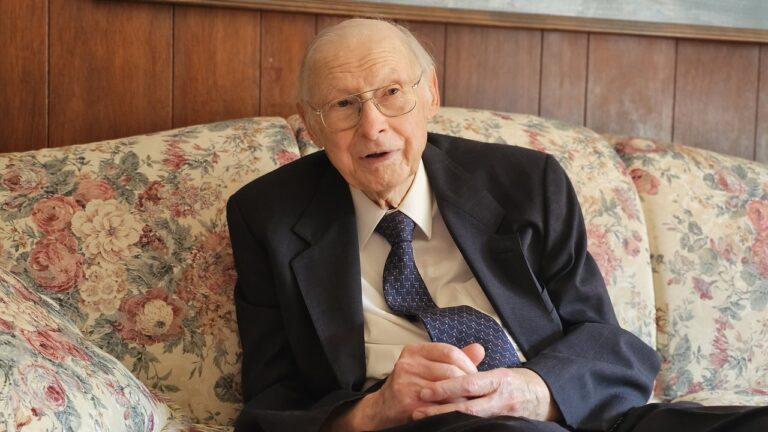This is an abridged version of the original interview first published on reformatus.hu.
Györgyi Papp and her husband, László Bőjtös, fled from Hungary to the United States on December 1, 1956, with the intention of returning soon. When history prevented their return, they alleviated their homesickness by serving the Hungarian community and cultivating the Hungarian intellectual and spiritual heritage in the diaspora. Since her husband’s death in 2021, Györgyi is less active in the Hungarian community, but her heart, soul and beautiful house are still open for all noble Hungarian causes.
***
You like to quote Hungarian poets and writers. Where does the enthusiasm for Hungarian literature and poetry come from?
I started secondary school in Pápa, Hungary, where I had a fantastic teacher of Hungarian language and literature. He always talked about something other than what was in the curriculum or what he was allowed to cover—since at that time we were already living the years of the emerging Communist dictatorship. He promised us: if we answered correctly, he would give us a book that was banned by that time, such as the famous The Tragedy of Man by Imre Madách.
Who else had a similar influence on you as a child?
We lived in Pozsony (Bratislava, at that time a town in Czechoslovakia; today the capital of Slovakia) as part of the local Hungarian minority until I was 13. My grandfather was very religious. He was a pillar of the local Reformed church. They had a mill, a huge plant with two hundred employees supplying the whole country. We lived in Cseklés, a village 15 kilometers from Pozsony and every month he asked a deaconess to visit us for a week to hold a daily Bible study for the whole family. It was mandatory to participate. When I was six or seven years old, I was already given an assignment: I had to read passages from the Bible, and then tell them the next day what those passages meant to me. We went to church every Sunday. I owe my deep faith to him, a great blessing from him that accompanied me throughout my life. And I had very good parents. My father, no matter how busy he was, played board games with me every night. My mother brought beautiful story books and piano pieces. They hired a Hungarian teacher who taught my cousin and me at home, and twice a week they took us to the only Hungarian school in Pozsony, where we were tested. I had a beautiful childhood, despite the fact that history interrupted my life at an early age. In 1938 we learned that our village was being returned to Hungary, while Pozsony remained part of Czechoslovakia. My talented aunt, who studied dress design in Vienna, sewed the Hungarian flag with a coat of arms out of silk and pinned it to the mill. She also made beautiful Hungarian clothes for my cousin and me, in which we welcomed the Hungarian soldiers with a bouquet of flowers and songs as they were marching in. Unfortunately, in the end, we remained part of Czechoslovakia (and shortly afterwards Slovakia). János Esterházy, the famous Hungarian aristocrat and politician, also lived there and tried to support the Hungarian cause through his connections, but he failed.
Another great source of inspiration was your husband, whom you often quote. How did you meet?
When the war ended and the population exchange agreement entered into force, my parents were told that our property would be confiscated, and they’d be sent to a labor camp. Our family lawyer found out that there was a water mill in Mihályi, Hungary, owned by a Slovak citizen and suggested that we try to swap the two properties. My mother was born and raised in America, because my maternal grandparents emigrated after World War I. After my grandmother’s death, my grandfather returned to Czechoslovakia, leaving behind two twenty-year-old sons and my teenage mother, and remarried. When my mother turned 19, her father invited her to live with him; that’s when she met my very handsome father, and they got married. My mother lived in Czechoslovakia, but she didn’t lose her American citizenship, and I also inherited the U.S. citizenship. My father suggested that we (my mother, my sister and I) should go to the U.S. to visit my two uncles, who were living in Cleveland, Ohio at the time, and if the mill exchange succeeded, we should return to Hungary, if not, he’d follow us.
We lived in America for a year; my sister and I went to school here. My father wrote to us in 1948 that he was living in Hungary, so we returned to him. I started attending the reformed college in Pápa, together with my cousin who was the same age as I. In January 1949, I attended a firemen’s charity ball, for which my aunt made my first ball gown. As soon as we entered the ballroom, a very tall young man approached us, and I danced with him for a long time. After that, he went back to Sopron where he studied, but I received a nicely worded letter from him. He was three years older than I. His father was a Lutheran deacon at Vadosfa, a nearby village. There was no Protestant church in our village (Mihályi), we belonged to theirs, our parents knew each other. Whenever he was at home, he always asked my parents if he could pay me a visit.
When did this summer romance become a marriage?
For a long time, life took us in different directions, but we were connected by many common interests and that certain little spark. I met him as a 14-year-old child, but I said yes to him as a 21-year-old adult. He was preparing to become a medical doctor, but he wasn’t accepted because of his father’s background, so he went to Tata to work at a construction site. After a year, he applied to the Faculty of Architecture in Budapest and managed to get in. Meanwhile, I attended the Kazinczy Ferenc Girls’ High School in Győr. Despite my love of literature, I majored in chemistry and physics. When I joined the Textile Research Institute in Budapest, we got in touch again, and by then it was obvious that we’d stay together. We got married on April 28, 1956.
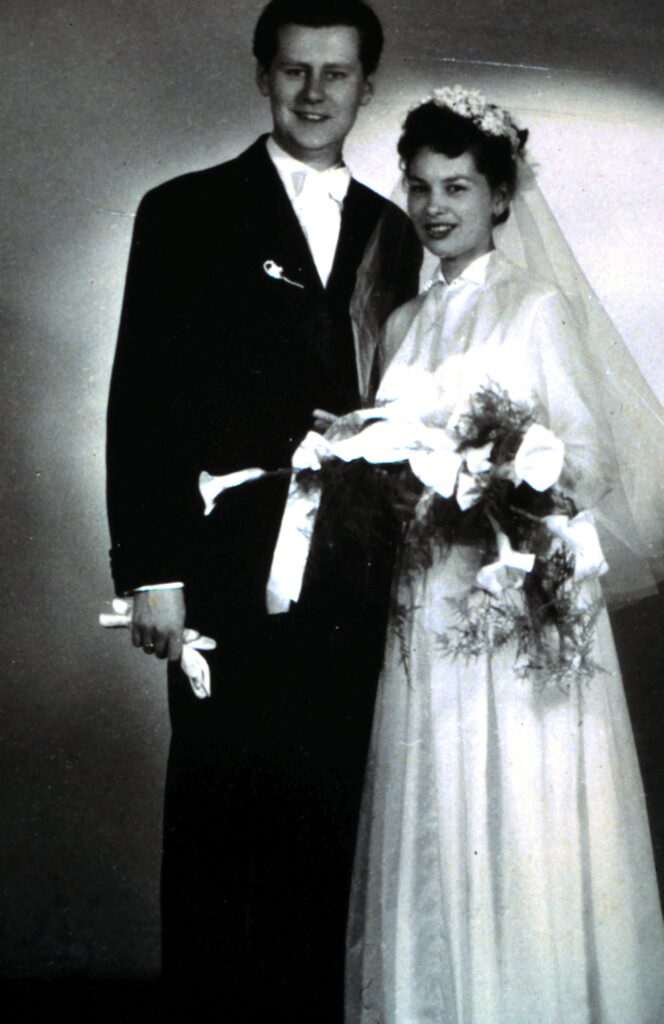
My parents had already lost everything by then, Laci’s mother was widowed, so only the immediate family attended our wedding. We lived in a sublet apartment, yet we were happy. We went to the theater and opera a lot, and in the summer to Lake Balaton. Laci worked together with his best friend, Béla Szittya, with whose wife I made a lifelong friendship. Laci kept in touch with Béla while in America; I treasure their literary correspondence with great affection.
How did you escape to America?
On October 23, 1956, Laci went to the University of Technology, then marched with the students to the Bem statue. I had to stay at home, because I was waiting for the delivery of the coal supplies. Meanwhile, the demonstration turned into a revolution, and Laci came home in the evening with the news that there’s fighting at the radio building with dead bodies on the streets. It was awful. We didn’t participate in the organization of the revolution or the armed fight, but we went out to the major demonstrations and were shot at. We spent the following weeks in Győr and Vadosfa, but Laci occasionally went to his office in Budapest, where he was warned: if he didn’t escape, he would be in big trouble. We didn’t have any plans or goals in America, we fled with the intention of returning as soon as possible. We left on December 1. At night an acquaintance took us one by one on a motorcycle to a farmer whose land bordered Austria. The man led us across the border, checking potential landmines as he walked ahead with a long stick. The Russians and the border patrol were repeatedly firing light rockets, but the sound came first followed by the light, so we had time to lie on the ground and stay motionless for a while. At one point our guide told us that we were in Austria. We stood there in the cold night, homeless, insecure, aware that the freedom fight was crushed. The Austrian Red Cross took us to a school building, where many people were sleeping in a large room on rubber mattresses. One of Laci’s colleagues was already living in Austria, and he helped us contact the consulate to obtain the immigration permits. We succeeded in just a few months; the Lutheran World Federation became our sponsor. I know others waited much longer, but it also seemed very long…
We spent Christmas Eve in Austria. The Austrian ladies were kind: when we went to a grocery shop for two slices of meat, they paid for us. Still, Christmas Eve was very difficult, as we wandered the streets and saw many beautifully decorated windows, and we had nothing but our Bible, which we received from the Lutheran pastor István Szépfalusi, who was holding service for the refugees. I was reminded of Kányádi’s wonderful Christmas poem Behind God’s Back. Still, it was our truest Christmas. That’s when we felt the most what it meant. I’ll never forget how we sat on the straw beds in the empty Russian barracks, ready to leave and reading the Bible while waiting. No glitter, no gifts, just a message of peace, goodwill and love, and the joy of the Savior’s birth.
How did your life in America begin?
We arrived at Camp Kilmer Military Base in New York and stayed there for two weeks, after which we got a train ticket to Cleveland. We arrived in a dress and a coat, with all our possessions in a small cardboard box. My mother’s brothers were waiting for us, and they took us to the Lutheran church on Sunday, where I had to tell the church community what our professions were. An architect immediately approached Laci, took him to his business the next day, and in two days he had a job. He was hired as a draftsman because he first had to learn the different units of measurement and the language. I knew English better—my mother had taught me—, so after two months I was already working at a research institute. We didn’t think we would get jobs in our professions; we thought we were going to clean houses as many others did. The church rented an attic apartment for us. The landlady didn’t allow us to open the window, so every Sunday we went to the nearest cinema, whatever was playing, because it was cool there…
In the meantime, you started to make a lot of friends.
Yes, the 56ers were all equally poor; we were united. In the early ’60s our daughters Anita and Barbara were born; we bought a house in nearby Brecksville, and I worked at the research institute there. My mother was able to visit us several times, although it was difficult for her to leave my father at home. We returned to Hungary for the first time after our immigration in 1968. It was a wonderful feeling to set foot on Hungarian soil, and after that we went back often, even though we were being watched by the communist authorities. We were very homesick, missed our family, correspondence was so slow at the time… But moving home was out of the question until the regime change in 1989–90, when it was too late—we couldn’t start all over again. Laci felt that he could do more for the Hungarians from here than if he moved back. In 1990 József Antall became the prime minister of Hungary, and he visited the U.S. the next year. Four hundred people waited for him in Cleveland and Laci was selected to welcome him. Laci was appointed Honorary Consul of Hungary on March 18, 1993. This was the first appointment of its kind in the United States and he held it until his death, for nearly thirty years.
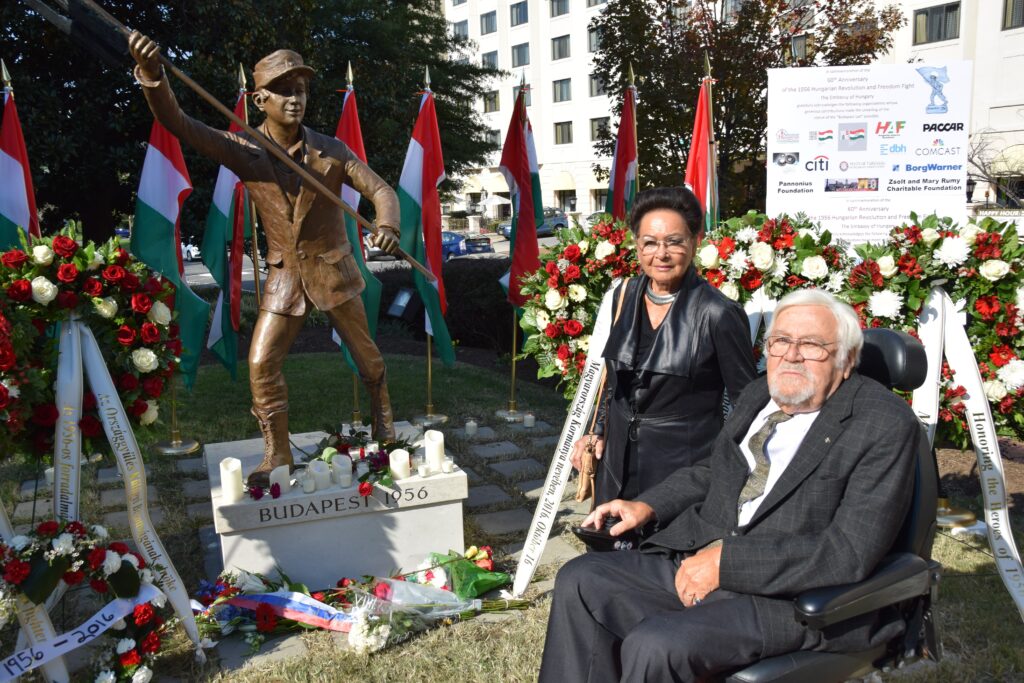
How did your house become a Hungarian intellectual center?
A group of intellectuals from Transylvania came for the first time in November 1971 including writers and poets, András Sütő, Sándor Kányádi, Árpád Farkas and several actors. Sándor Püski, the owner of a small bookstore in New York, sent them to us and we embraced them. They were welcomed by Laci and the poet Gyurka Gyékényesi. Afterwards, Laci also organized many such trips for them and others. Our guestbook contains 82 entries from the early ‘70s to the ‘90s. These occasions also helped us endure our strong homesickness. Almost all of them became friends. Budapest-based leading intellectuals also visited us during these decades: Sándor Csoóri, Mihály Czine, András Görömbei, Béla Pomogáts, Lajos Für, István Csurka and others. We had many visitors from Felvidék (Highlands, today Slovakia), for example Péter Nagy Püspöki, Miklós Duray and László Dobos. We became especially close friends with the latter; we met with him every year and I cherish his wonderful letters.
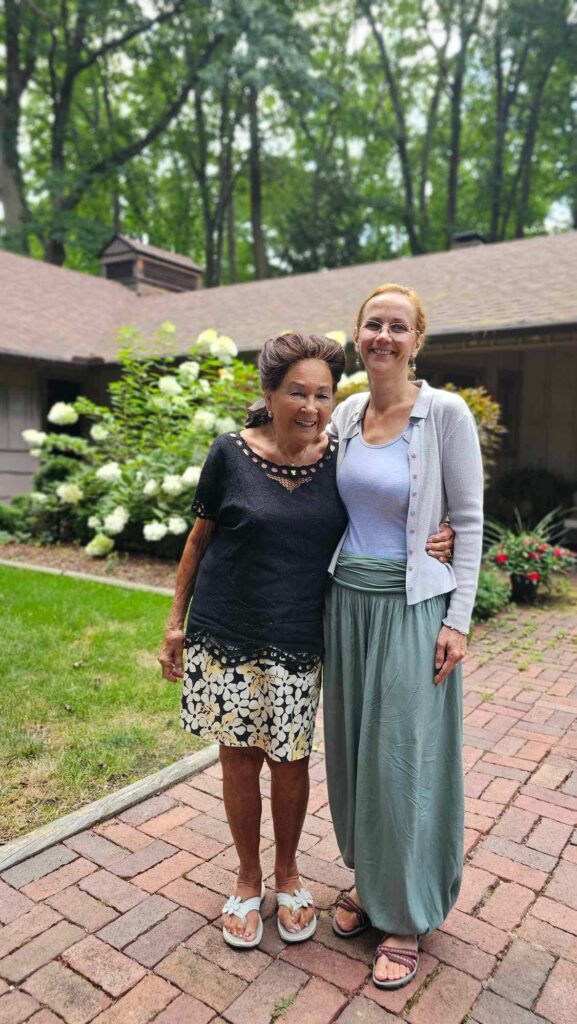
But not everyone looked favorably on them; many people thought that those Hungarians who were allowed to come from the Carpathian Basin were all communists or their proxies. They were also punished at home for these trips. There were times when the church lent a room for the events, but they often simply took place at our house. It’s not ostentatious, but it’s warm and natural; the windows bring nature close. In our marriage, it was Laci who usually made the important decisions but I was the one who insisted on buying this particular house. When he was forced into a wheelchair at the end of his life, he became grateful for it, because we could take care of him at home (instead of an institution) and he could easily go out into the yard. He said: this is our paradise.
László also became the president of the Magyar Baráti Közösség (MBK, Hungarian Communion of Friends). How did he become such an intellectual engine in the diaspora?
The MBK, which organizes the ITT-OTT (Here and There) conferences, started towards the end of the ’60s, when we met many young Hungarian intellectuals who were preoccupied with the same matter: the uncertainty of the refugee status. The immigrant youth movements didn’t see the long-term perspective of being Hungarians in America. They believed that while the immigrant mentality leaves only two ways open, returning home or assimilating, the diaspora spirit made it possible to stay abroad. The diaspora mentality finds the meaning of Hungarian identity in the traditional folk values and advocates these throughout the world. It doesn’t isolate itself either from the world or from present-day Hungary but nurtures contact with both; builds and maintains relationships everywhere. The idea of a ‘borderless homeland’ was therefore formulated: ‘Wherever there is a Hungarian, there is Hungary.
In 1973 an annual one-week community gathering began, also organized by Laci, which moved to Lake Hope in Ohio after three years. Hundreds of Hungarian intellectuals paid a visit there, and then typically to us. Close to 300 people participated in the first conference. However, after the regime change, maintaining contact with Hungary became easier, and interest in these kinds of gatherings dropped.
Yet your house remained a frequently visited intellectual center.
Since the beginning of the ’90s, we’ve hosted professional and political organizations and individuals in Hungary and the Carpathian Basin, supported by the USIA and USAID programs: mayors, university delegates, business leaders and politicians, among others, Géza Entz, György Granasztói, György Frunda from Romania, György Tokay or József Kasza from (former) Yugoslavia, László Józsa or Iván Gyurcsík from Slovakia. In recognition of our hospitality, the Cleveland Council on World Affairs awarded us both a ceremonial diploma. In May 1999, Hungary joined NATO, and as a precursor to that, in August 1993, the U.S. Department of Defense asked the Cleveland National Guard to coordinate the preparation of the Hungarian military for NATO accession. We hosted Hungarian and American staff delegations three times during those years, for which the State of Ohio honored us with the Ohio Distinguished Service Award.
In 2000, Minister of Education Zoltán Pokorni and his delegation visited us here, too. In 2002, Hungarian President Ferenc Mádl awarded Laci the Middle Cross of the Order of Merit of Hungary for his activities in the interest of Hungarians and in 2003, he received the Pro Auxilio Civium Hungarorum commemorative medal from the Hungarian Minister of Foreign Affairs. On October 23, 2004, Prime Minister Viktor Orbán (at that time the leader of the parliamentary opposition), who was visiting Cleveland as a speaker, also had dinner with us. We met him previously as prime minister in Washington DC in 1998. In addition to being a president of the MBK, Laci was the three-time president of the Cleveland Hungarian Club, the president of the board of directors of the American Hungarian Foundation and a member of the board of trustees of the Hungarian American Coalition.
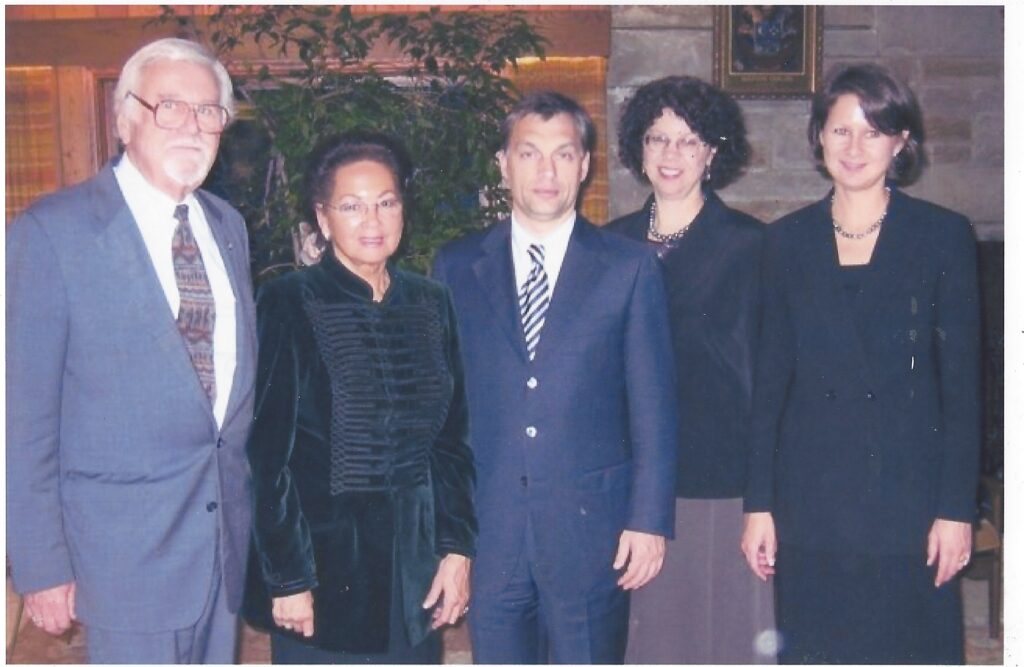
What about your business your husband supported from the background?
Laci built two churches in Chicago and once I accompanied him on his visit to the city. It was our wedding anniversary, so he took me to a jewelry store to buy me a beautiful ring from their unique, wonderful stock. At Laci’s suggestion, we bought some jewelry, and later we opened a small shop in a new shopping center in Cleveland. This happened 40 years ago, and today we have our own building, studio, goldsmith, and we work with international designers. It was very difficult at first; if I had known, I wouldn’t have started it. We had to be open from 10 am to 9 pm every day and it entailed a lot of risk. Fortunately, I never got into major trouble. My younger daughter Barbara got involved while she was a student. Laci wanted her to pursue architecture, but after our daughter spent a summer as an intern with him, she refused. At university, she studied business and programming, while her husband studied finance. This is a very good combination, they could make excellent use of it. We worked well together for a long time, then she took over the business.
You always stood by your husband, which I assume wasn’t always easy…
When we came to America, both of Laci’s kidneys were attacked by disease, it couldn’t be cured. I prayed a lot to the Lord to not let him go. His disease completely disappeared, and he could live a normal life until he retired. This was a miracle, since the doctor didn’t encourage us at all, yet he lived until the age of almost 90.
Everything he did for the Hungarian people, especially all those meetings, I was part of and loved them very much, just as well as baking and cooking for these occasions. He organized charity dinners for really affluent people: five men in suits and white gloves served food to very rich Americans, while the women prepared the soups and washed the dishes. A dinner for ten guests cost 3,000 dollars, but usually three more dinners were immediately booked. That was considered very serious money at the time. For example, we could buy and send several TV satellites to Transylvania, supply computers for schools in Hungary, medicine and equipment for hospitals, etc. He was a charismatic man…Everything we’ve been through connected us. That’s why it’s so hard without him… I’m eternally grateful to my daughters and grandchildren, because they surround me with endless love and constant care: we are in daily contact and have dinner together every Sunday. I’m praying that I’ll live until we properly record my husband’s legacy.
Read more Diaspora interviews:

